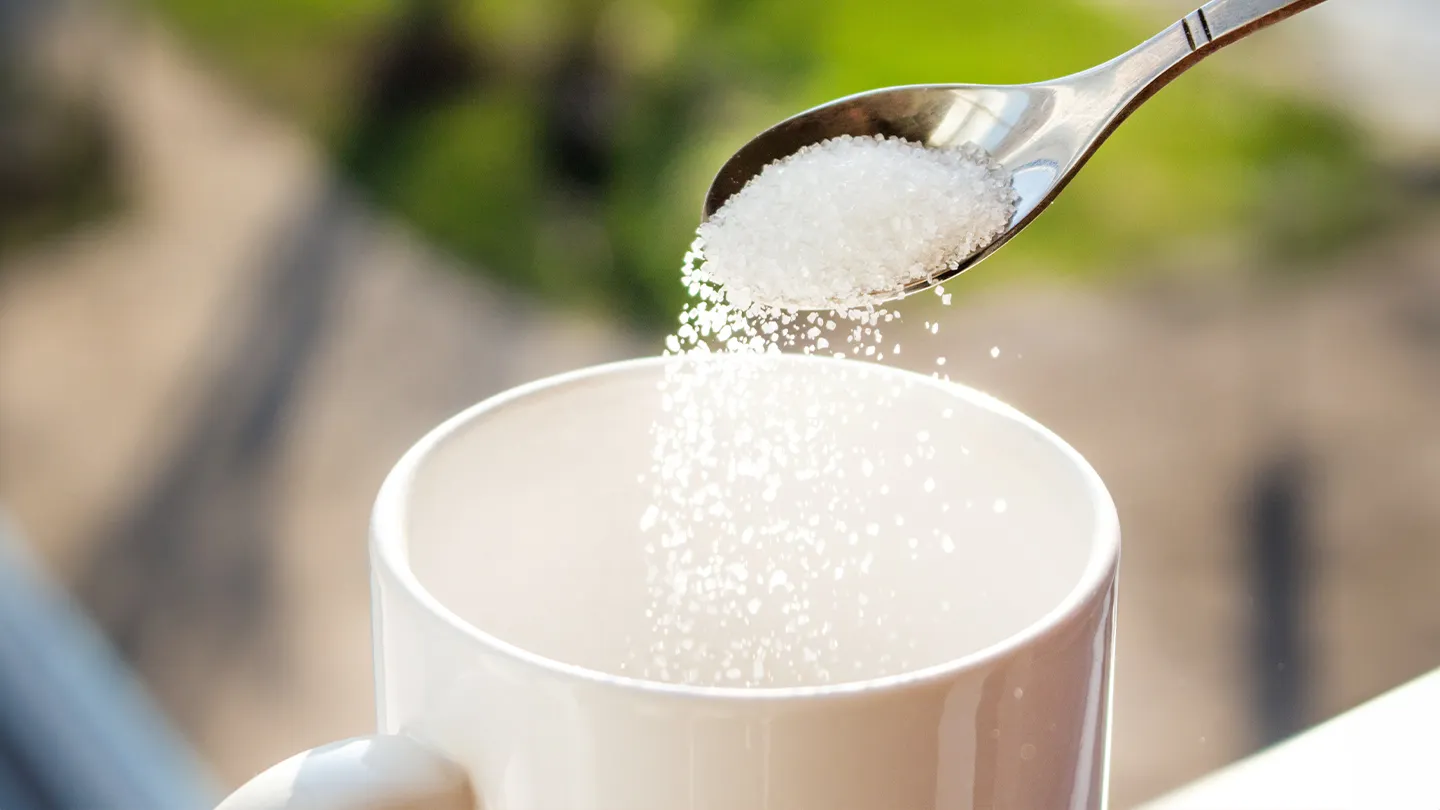If you’ve ever wished you could partake in your favorite sweets while still shedding pounds, you’re definitely not alone.
Enter allulose: a sugar substitute that may help you do just that. With just 10 percent of the calories found in table sugar (along with about 70 percent of the sweetness), allulose may seem like every dieter’s dream.
Not only that, but this sweetener is naturally found in several food sources — including raisins, figs, and molasses — and may even be tied to a few possible health perks.
Still, you may be concerned about the safety of this sugar substitute and if it can fit into a healthy diet. Below, experts explain some of the key benefits and potential downsides of allulose, plus whether it can satisfy your sweet tooth and help you lose weight.
What Is Allulose?
Allulose — also known by its scientific name, D-psicose — is a type of naturally occurring sweetener found in foods like wheat, maple syrup, and kiwi. Because it has a chemical structure similar to fructose (the same type of sugar found in fruit), it can even be produced commercially from ingredients like beet sugar or corn. (1)
What Are the Benefits of Allulose?
Allulose is almost as sweet as table sugar, but isn’t digested or absorbed by the body in the same way, meaning that it provides only a fraction of the calories. In fact, regular sugar contains about 4 calories per gram, whereas each gram of allulose contains just 0.4 calories. (1) Plus, unlike many other popular sugar substitutes, it doesn’t have a bitter aftertaste, making it a great choice to sweeten everything from coffee to baked goods and beyond. And as allulose has become more readily available over recent years, it has even started popping up in many sugar-free snacks, including keto-friendly desserts, candies, sauces, and spreads.
Is Allulose Safe?
Nicole Swingle, RD, a sports nutrition and weight management specialist, says that allulose is perfectly safe. In fact, the Food and Drug Administration has added allulose to their list of “generally recognized as safe” ingredients, meaning that it’s totally fine to add to foods and beverages sold in the United States, along with other parts of the world like Mexico, Japan, and South Korea. (2)
Of course, that doesn’t mean you should start eating allulose straight by the spoonful. “Start off small, with just one serving, and see how your body reacts to it before you start to heavily incorporate it into your diet,” advises Roxana Ehsani, RDN, a board-certified sports dietitian.
So how much is too much? As a general rule of thumb, limit your intake to around 0.4 grams per kilogram of body weight per serving, and around 0.9 grams per kilogram over the entire course of the day. (3) Translated: If you weigh 150 pounds, you’ll want to stick to less than 27 grams (or 7 tablespoons) at a time, and less than 61 grams (or 15 tablespoons) per day, which is probably way more than you would eat at a time anyway. Or, to keep things even more short and sweet: as with regular sugar, moderation is key. Enjoy a few servings each day, but don’t go overboard.
What Are the Downsides of Allulose?
Like many other sugar substitutes, allulose can cause mild digestive issues like bloating or gas for some people, according to Ehsani. In super high amounts, it could even cause more serious symptoms, like severe nausea, headaches, and appetite loss.
However, it’s pretty unlikely you’d eat enough allulose for this to be an issue. One study found that these symptoms started popping up when people consumed about 1 gram of allulose per kilogram of body weight. To put that into perspective, that means a person weighing about 150 pounds would have to eat over 17 tablespoons before these symptoms might appear. (3) Therefore, a scoop or two used here and there probably won’t cause any problems for most people.
How Can Allulose Affect Weight Loss?
If weight loss is your goal, swapping regular sugar for allulose might be worth a try. “Allulose actually gets excreted out of our body [through the urine] and is not metabolized, which is why it has so few calories,” explains Swingle. Ehsani agrees, noting that it also tastes similar to sugar and can be a healthier, low-calorie way to sweeten your favorite foods.
Beyond slashing your calorie intake, allulose might even help promote weight loss through a few other mechanisms as well. For instance, one study found that allulose could significantly decrease body fat by boosting fat burning and blocking the absorption of dietary fat. (4) What’s more, it might even help speed up your metabolism and increase levels of certain hormones that help keep you feeling full, which could also make weight loss easier. (5, 6)
Can Allulose Help to Curb Sugar Cravings?
If you’re worried about whether using non-nutritive sweeteners can cause your sugar cravings to skyrocket, fear not. Though Ehsani emphasizes that more research is needed to fully understand the effects of low-calorie sweeteners like allulose, the science so far has been pretty promising.
“If you are using allulose instead of regular sugar in your coffee because you love having a sweet cup of joe, it likely will satisfy your sweet cravings,” says Ehsani. In fact, studies show that sugar substitutes actually don’t have any impact on your sweet tooth or energy intake, making them a solid choice to help curb sugar cravings. (7)
What’s more, allulose can even help you get a handle on your blood sugar levels. (8) According to Swingle, allulose doesn’t impact blood sugar levels the same way as other sugary sweets. It could also help prevent dips and spikes in blood sugar, which can be a common culprit of cravings. (9)
If you’re interested in giving allulose a try, start out slow and steady. Add a small scoop to your morning coffee, mix it into low-carb cocktails, or use it in your favorite baked goods and sweet treats instead of sugar. And, of course, remember to enjoy allulose in moderation, alongside a variety of other nutritious foods as part of a balanced diet.
Editorial Sources and Fact-Checking
- Daniel H, Hauner H, Hornef M, et al. Allulose in Human Diet: The Knowns and the Unknowns. British Journal of Nutrition. August 19, 2021.
- Recently Published GRAS Notices and FDA Letters. U.S. Food and Drug Administration. November 30, 2023.
- Han Y, Choi BR, Kim SY, et al. Gastrointestinal Tolerance of D-Allulose in Healthy and Young Adults. A Non-Randomized Controlled Trial. Nutrients. December 19, 2018.
- Han Y, Kwon E-Y, Yu MK, et al. A Preliminary Study for Evaluating the Dose-Dependent Effect of D-Allulose for Fat Mass Reduction in Adult Humans: A Randomized, Double-Blind, Placebo-Controlled Trial. Nutrients. January 31, 2018.
- Kimura T, Kanasaki A, Hayashi N, et al. D-Allulose Enhances Postprandial Fat Oxidation in Healthy Humans. Nutrition. July 6, 2017.
- Teysseire F, Bordier V, Budzinska A, et al. The Role of D-Allulose and Erythritol on the Activity of the Gut Sweet Taste Receptor and Gastrointestinal Satiation Hormone Release in Humans: A Randomized, Controlled Trial. The Journal of Nutrition. May 5, 2022.
- Wilk K, Korytek W, Pelczyńska M, et al. The Effect of Artificial Sweeteners Use on Sweet Taste Perception and Weight Loss Efficacy: A Review. Nutrients. March 16, 2022.
- Tani Y, Tokuda M, Nishimoto N, et al. Allulose for the Attenuation of Postprandial Blood Glucose Levels in Healthy Humans: A Systematic Review and Meta-Analysis. PLoS One. April 6, 2023.
- Anguah KO, Syed-Abdul MM, Hu Q, et al. Changes in Food Cravings and Eating Behavior after a Dietary Carbohydrate Restriction Intervention Trial. Nutrients. December 24, 2019.

